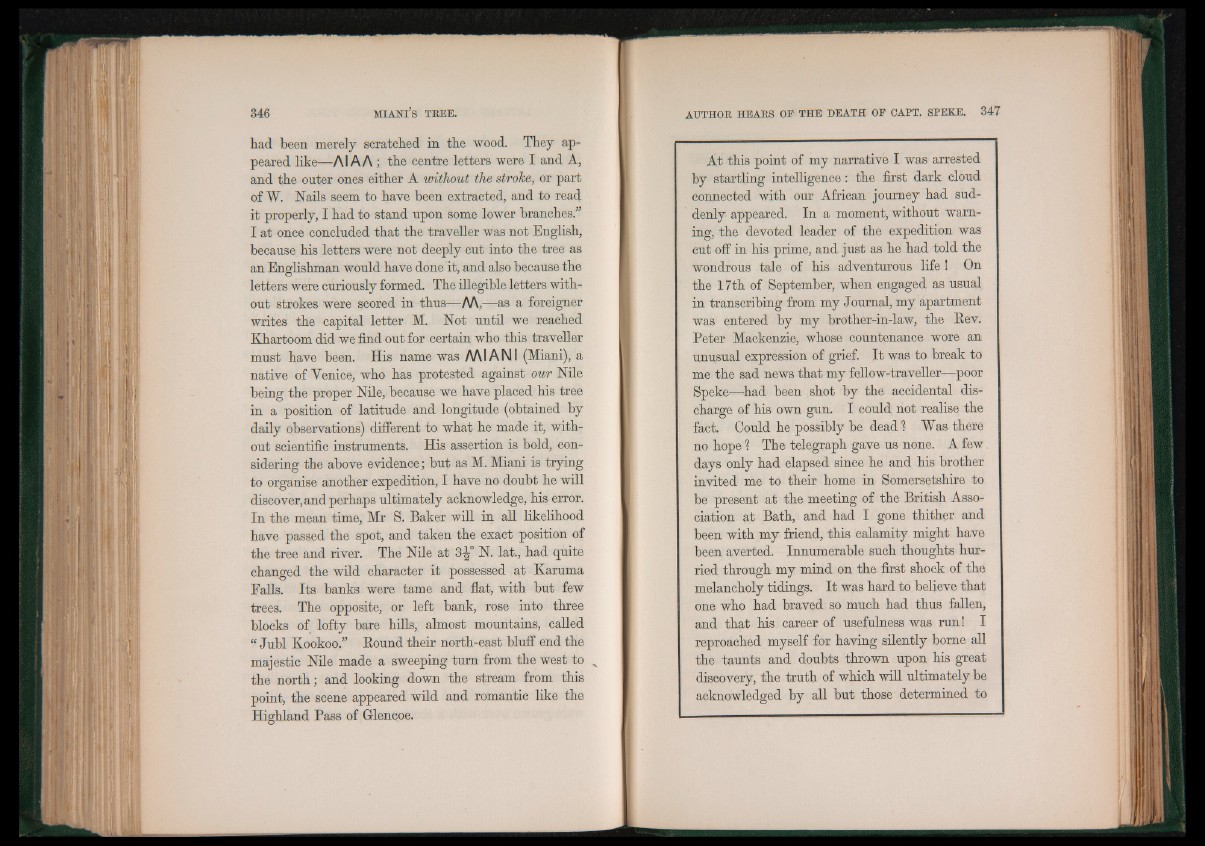
had been merely scratched in the wood. They appeared
like—AI A A ; the centre letters were I and A,
and the outer ones either A without the stroke, or part
of W. Nails seem to have been extracted, and to read
it properly, I had to stand upon some lower branches.”
I at once concluded that the traveller was not English,
because his letters were not deeply cut into the tree as
an Englishman would have done it, and also because the
letters were curiously formed. The illegible letters without
strokes were scored in thus—AA,—as a foreigner
writes the capital letter M. Not until we reached
Khartoom did we find out for certain who this traveller
must have been. His name was AAIANI (Miani), a
native of Yenice, who has protested against our Nile
being the proper Nile, because we have placed his tree
in a position of latitude and longitude (obtained by
daily observations) different to what he made it, without
scientific instruments. His assertion is bold, considering
the above evidence; but as M. Miani is trying
to organise another expedition, I have no doubt he will
discover, and perhaps ultimately acknowledge, his error.
In the mean time, Mr S. Baker will in all likelihood
have passed the spot, and taken the exact position of
the tree and river. The Nile at 3^° N. lat., had quite
changed the wild character it possessed at Karuma
Falls. Its banks were tame and flat, with but few
trees. The opposite, or left bank, rose into three
blocks of lofty bare hills, almost mountains, called
“ Jubl Kookoo.” Bound their north-east bluff end the
majestic Nile made a sweeping turn from the west to v
the north; and looking down the stream from this
point, the scene appeared wild and romantic like the
Highland Pass of Glencoe.
At this point of my narrative I was arrested
by startling intelligence: the first dark cloud
connected with our African journey had suddenly
appeared. In a moment, without warning,
the devoted leader of the expedition was
cut off in his prime, and just as he had told the
wondrous tale of his adventurous life ! On
the 17th of September, when engaged as usual
in transcribing from my Journal, my apartment
was entered by my brother-in-law, the Bev.
Peter Mackenzie, whose countenance wore an
unusual expression of grief. I t was to break to
me the sad news that my fellow-traveller—poor
Speke-—had been shot by the accidental discharge
of his own gun. I could not realise the
fact. Could he possibly be dead? Was there
no hope ? The telegraph gave us none. A few
days only had elapsed since he and his brother
invited me to their home in Somersetshire to
be present at the meeting of the British Association
at Bath, and had I gone thither and
been with my friend, this calamity might have
been averted. Innumerable such thoughts hurried
through my mind on the first shock of the
melancholy tidings. I t was hard to believe that
one who had braved so much had thus fallen,
and that his career of usefulness was run! I
reproached myself for having silently borne all
the taunts and doubts thrown upon his great
discovery, the truth of which will ultimately be
acknowledged by all but those determined to